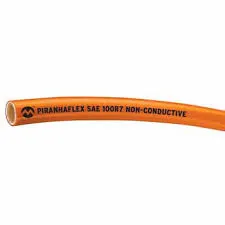joulu . 10, 2024 22:01 Back to list
CE Certification for R1/R2 Hydraulic Hose Manufacturing Company
CE Certification for R1/R2 Hydraulic Hose Companies
In today's industrial landscape, the emphasis on safety and quality has never been more critical. As hydraulic systems play a pivotal role in various applications, from construction and manufacturing to automotive and aerospace, ensuring the reliability and safety of hydraulic components, particularly hoses, is essential. One way to achieve this is through compliance with the CE certification, which marks products that meet the European Union's health, safety, and environmental protection standards. This article will explore the importance of CE certification for R1 and R2 hydraulic hose companies and how it impacts their operations and marketability.
Understanding R1 and R2 Hydraulic Hoses
Hydraulic hoses are vital for the transmission of hydraulic fluid in hydraulic systems. The R1 and R2 hoses refer to two different types of hydraulic hoses defined by specific standards. The R1 hose is a single wire braid hose, while the R2 hose consists of a double wire braid. Both types are designed to handle high pressure and are used in various applications where the transfer of hydraulic fluid is necessary. Their strength, flexibility, and resistance to wear and tear make them essential for the smooth operation of hydraulic equipment.
The Significance of CE Certification
CE certification is an essential accreditation for companies wishing to sell their products in the European market. It signifies that the product meets the required standards and complies with European regulations, ensuring safety and reliability. For R1 and R2 hydraulic hose companies, obtaining CE certification not only enhances product credibility but also opens doors to international markets.
1. Quality Assurance The CE certification process involves rigorous testing and assessment of products. For hydraulic hoses, this means evaluations related to pressure performance, burst strength, and durability are conducted. Companies that achieve CE certification demonstrate their commitment to maintaining high quality, giving customers confidence in the safety and reliability of the hoses.
2. Market Access In many regions, especially in the European Union, CE marking is mandatory for products entering the market. Without it, products may be restricted, leading to loss of potential sales and market share. For R1 and R2 hydraulic hose manufacturers, securing CE certification facilitates easier access to these lucrative markets.
ce certification r1/r2 hydraulic hose company

3. Enhanced Safety Standards The guidelines that govern CE certification necessitate that manufacturers prioritize safety in their design and production processes. This focus results in safer hydraulic hoses that lower the risk of accidents and system failures in critical applications.
4. Competitive Advantage In an increasingly globalized marketplace, having CE certification can differentiate a company from its competitors. It signals to clients and stakeholders that the company adheres to rigorous safety and quality standards, which can be a decisive factor in purchasing decisions.
5. Regulatory Compliance The CE certification process helps companies stay compliant with relevant regulations, minimizing the risk of legal issues or penalties associated with non-compliance. This proactive approach fosters a culture of responsibility within the organization.
The Path to CE Certification
Achieving CE certification involves several steps. Companies must first familiarize themselves with the applicable directives and standards for hydraulic hoses. They then need to conduct a thorough assessment of their products, often involving third-party testing and validation. Once the requirements are met, the company can affix the CE mark to its products, indicating compliance.
Conclusion
For R1 and R2 hydraulic hose companies, CE certification is more than just a regulatory requirement; it's a testament to their commitment to quality, safety, and customer satisfaction. By achieving CE certification, these companies not only enhance their credibility but also ensure compliance with European standards, opening up new avenues for growth and success in the competitive hydraulic market. In an industry where reliability is paramount, investing in CE certification is a strategic step towards building trust and fostering long-term relationships with clients and stakeholders alike.
-
Extremely High Pressure Hydraulic Hose Durable & High-Performance Solutions
NewsMay.16,2025
-
Marine Hydraulic Hose Flexible R5 Soft Rubber Hoses for High Pressure
NewsMay.16,2025
-
Parker Metal Hose High-Performance Flexible Hydraulic Solutions
NewsMay.16,2025
-
Affordable Flexible Metal Hose Price Reliable Hydraulic Hose Suppliers
NewsMay.15,2025
-
Summit Flexible Hydraulic Hoses - High-Pressure & Corrosion-Resistant
NewsMay.15,2025
-
Hydraulic Hose Guard Durable Flexible Rubber Protection for Heavy Machinery
NewsMay.14,2025
